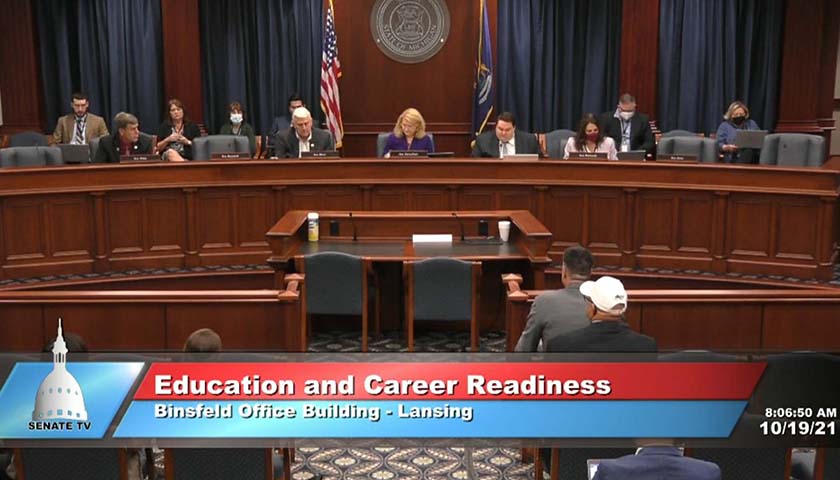by Bruce Walker
In what was characterized as a blow against the state constitution’s Blaine amendments, members of the House and Senate on Tuesday passed a slate of bills aimed at providing opportunity scholarships for Michigan students.
Senate Bills 687 and 688 and House Bills 5404 and 5405 all passed mainly along party lines, with Republicans supporting the legislation and Democrats in opposition. Each chamber’s respective education committees moved the bills forward earlier in the day.
Among other provisions, the bills would establish the Michigan Student Opportunities plan for eligible students, as well as
- Allow organizations to apply for certification to grant scholarships
- Provide for the certification of scholarship-granting organizations
- Provide for student opportunity scholarship accounts and prescribe conditions for the use of those funds
- Provide for the administration of the student opportunity scholarship program
- Prescribe powers and duties of certain state officers, agency and departments
- Provide appropriations for the implementation of this act
- Allow certain tax credits and deductions
Student eligibility is determined by whether their families qualify for free-and-reduced school lunch, and those families at or below 200% of the free-and-reduced lunch eligibility. Families with special needs students also would qualify for the scholarships.
“Simply put, today’s developments should renew the hopes of families across Michigan who want to let their kids learn, even as COVID continues to disrupt schooling routines,” Mackinac Center for Public Policy (MCPP) Education Director Ben DeGrow said in a statement.
“Elected lawmakers have taken a stand for trusting parents to direct their children’s education and embracing a dynamic and flexible approach that funds students, not just systems,” DeGrow added. “The Student Opportunity Scholarship plan deserves full support. Enacting the program would offer more than a million Michigan students the sort of broad access to education options that’s already available in many other states.”
The legislation was introduced after a group of parents, represented by the MCPP Legal Foundation, challenged the so-called Blaine amendments in the Michigan constitution.
Once included in as many as 37 state constitutions, Blaine amendments were rendered unconstitutional in the 2020 U.S. Supreme Court Espinoza v. Montana Department of Revenue decision. Although the Supreme Court’s majority ruling determined states are not required to fund private schools, those states that do so are violating the U.S. Constitution when they disqualify private schools from receiving public money solely on religious grounds.
“If we’ve learned anything in the past two years, it’s that parents need as many opportunities as possible to help their children get a great education,” Michigan Association for Public School Academies President Dan Quisenberry said in a statement. “For many students, that includes addressing significant learning loss and trauma accumulated over the course of the pandemic, especially when you’re talking about our most vulnerable students – those who live in poverty and those with special needs. We support any plan that opens the door to more opportunities for these students, and the Michigan Student Opportunity Accounts plan does exactly that.”
According to the MCPP, 80% of Michigan’s 270,000 nonpublic school students attend Catholic schools, and 98% attend some type of school with a religious affiliation.
“Governor Whitmer shut down Michigan schools. Then, Whitmer vetoed reading scholarships for students who fell behind as a result of those shutdowns. It’s time for Whitmer to finally let kids learn,” Michigan Freedom Fund Executive Director Tori Sachs said in a statement. “Wealthy families can already afford to pay for their students’ educational needs. It’s time every family has the same options.”
Sen. Dayna Polehanki, D-Livonia, opposed the Senate bills, comparing the educational scholarship accounts (ESAs) established by the proposed legislation to voucher plans rejected by Michigan voters at the ballot box in 2000 and 1974.
“I wonder why the bill sponsor wouldn’t simply try to change the Michigan constitution,” Polehanki said during a question and answer period during the Tuesday Senate committee meeting. “Even though … this was put up to Michigan voters in the year 2000 and in 1974, and vouchers failed with 68 and 74% of the vote respectively. So vouchers are not popular in Michigan.”
Eric Ventimiglia, executive director for Michigan Rising Action, supports the bills but noted his disappointment in the Democrats who voted against the proposed legislation.
“It is shameful that Michigan Democrats regularly put powerful teacher unions and campaign donors before parents and students,” Ventimiglia said. “Their opposition to legislation that benefits student’s unique needs is not just playing political games, it is a dereliction of duty.”
– – –
Bruce Walker is a regional editor at The Center Square. He previously worked as editor at the Mackinac Center for Public Policy’s MichiganScience magazine and The Heartland Institute’s InfoTech & Telecom News.
Photo “Michigan Senate Committee on Education and Career Readiness” by Michigan Senate.





